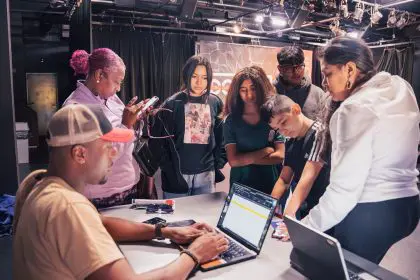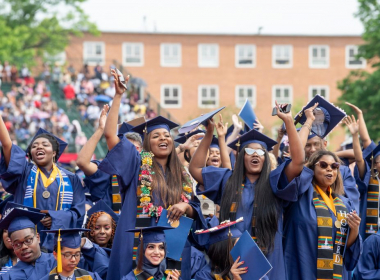
Author H. Victoria Hargro Atkerson, who penned Buttermilk Bottom, a sizzling drama placed in a 1950s historical cocoon that reveals the experiences, the lives, and personalities of those affected most by Jim Crow laws, legalized prejudice, and discrimination in the South, pens an essay here on the anniversary of the Voting Rights Act of 1965 and why you must vote.
The upcoming anniversary of the Voting Rights Act of 1965 takes me back to when we as Black people could not vote. Growing up in a segregated society seemed normal as a young child, playing in the streets of Atlanta with my peers, but as I entered my teen years, it really hit me how much difference there was between Black and White living conditions. The first time I became angry over those differences was on my trip to Harlem, New York.
My family could not afford to send my sibling and I to summer camp, so they shipped us off to relatives. Plans were made for us to visit my aunt and uncle in Harlem at 141st and Lenox Avenue. My younger sister and I packed and rushed to the car that would take us to the train station. Excited about the trip, we quickly noticed the beautiful station and my excitement grew, until we entered the colored waiting room, which looked nothing like the pristine area where whites were seated. Nothing was going to kill my enthusiasm for the trip because, after all, we were traveling alone for the first time in our lives and we were going to New York City.
My mother gave us very specific instructions about the trip. She told us who we could and could not talk to and how to behave on the train. I remember her saying, “Make sure you get off at the right stop. There’s a town called Newark, that is not where you want to go. You are to get off in New York City. Tell the conductor where you are going, and he will make sure you get off at the right stop.” We happily got on the Southern Crescent and were surprised that we were in the first car. After being seated, we saw that the rest of the passengers in the first car were black. It felt wonderful at first, knowing that I was in the first car heading for New York. My mother packed our lunch (fried chicken, deviled eggs, cake and fruit) in a shoebox while she explained that we were not allowed in the dining car as only whites could eat there. Sitting in the first car on the train heading north, I discovered why we were allowed, at last, to sit in the first car. The smoke and odor from the fuel flowed freely through the first car, adding another insult to Blacks trapped there, who paid the same rates as Whites. The America we lived in was not the America I studied about in school. Knowing that there were separate laws that governed our lives became crystal clear me on the train to Harlem.
Living in a duplicitous society, Black parents took time educating their children how to move around without fear and without threat of violence, trying to keep their children safe. We were told what to do and how to behave in the presence of Whites, but we were also told that we deserved better and that we were as good as anyone, Black or White. As we grew up and realized the true nature of Jim Crow laws, we took on responsibilities to correct a bad situation. Voter registration was always a special project of my mother’s that she insisted that we participate in from a very young age. We went door to door with her as she encouraged our neighbors to sign the registration forms that we carried in our arms. Before long, my mother instructed my sister and I to take one side of the street while she took the other side of the street and we continued to knock on doors and give the speech that we heard our mother give as she quietly role-modeled what we were expected to do. I was twelve the first time I went out to register people to vote. I was tasked with very specific instructions: “Explain it if they don’t understand how important voting is. If they can’t write their name, you teach them how.” Then she would say, “Don’t come back until you are finished.” At 12, I had no idea what voting meant.
Years later, when the Voting Rights Act of 1965 was passed in Congress, I remember the smile on my mother’s face. It was another victory that we had won in gaining participation in our government. She was happy, but she was not overjoyed because she knew there was much yet to do and to accomplish. But that day, she was satisfied.
I often wonder what she would think of our situation today. We have people in Congress questioning our right to vote in 2016. We have young Black men and women killed on the streets of America because they were guilty of being Black. Who would have thought that our country, our government, would be controlled by the NRA? I know my mother would be shocked that a racist won the primary for the Republican Party. She was a staunch Republican because she was taught, like many back in those days, that Lincoln freed the slaves, and her devotion to that party was sealed. Today, after getting firsthand information about what occurred during the Civil War and during Reconstruction, we have learned otherwise. Lincoln freed some enslaved Africans, not all.
On Aug. 6, 2016, the anniversary of the Voting Rights Act of 1965, I encourage everyone who is concerned about the future and the direction of this country to begin a voter registration drive. It’s the perfect time to celebrate the law that confirmed our right to vote and have a voice in our government. We have until November to get as many people registered to vote as possible. We must go to the polls and vote for the person who will stop the senseless killing of Blacks, who will stop the racial profiling, who will silence and dethrone the NRA, and who will honor the principles and values stated in the Constitution and the Declaration of Independence. If you have any doubts about who to vote for, take a minute and pull up a video of Selma’s Bloody Sunday and ask the question, “Did those demonstrators deserve the treatment they received for demanding the right to vote?” Then, vote your conscience. … Vote for the America you want for your children and the many generations that will follow us.










